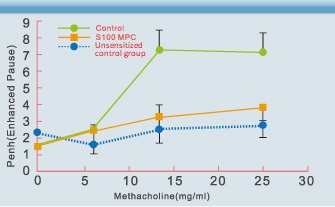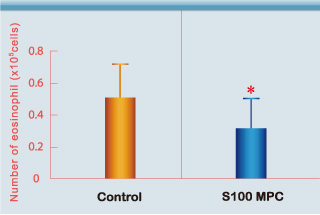
HOME > Research
Animal Study(9)

Fig. 2. S100 MPC helps to relieve respiratory tract resistance and breathing difficulty caused by administration of allergen(9). * p<0.05
Lin (2007) fed separate groups of animal subjects with either water (control group) or with S100 Milk Protein Concentrate (MPC) (treatment group). After six weeks' feeding, AHR symptoms of the animal subjects (induced by methacholine inhalation) in the treatment group was significantly relieved compared to the control group (Fig. 2). The production of IL-13 and interferon-γ was also reduced, as well as the numbers of eosinophils accumulating in the lungs (Fig. 3). In addition, the amount of IL-4 secreted was reduced, which subsequently results in the reduction in levels of IgE antibodies associated with allergy (Fig. 4). S100 MPC was also shown to inhibit the production of inflammatory cytokines in the trachea and lung of animal subjects, which will help to reduce the accumulation of inflammatory cells suggesting a positive regulatory effect on the development of a balanced immune system(9).
In the same study, it was shown there was no significant difference in the activity of phagocytes and NK cells between the control and S100 MPC group. These results demonstrate that S100 MPC does inhibit allergic immunoreactions, but does not negatively affect normal immunoreactions(9).

Fig. 3. Eosinophil counts in the lungs of the S100 MPC group were significantly reduced(9). * p<0.05

Fig. 4. The levels of IgE antibody induced by allergen administration were significantly reduced in the S100 MPC group(9).* p<0.05

